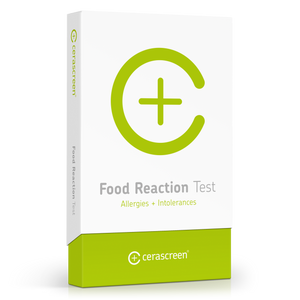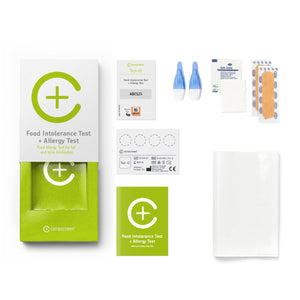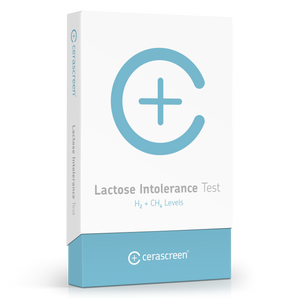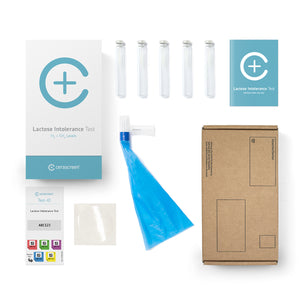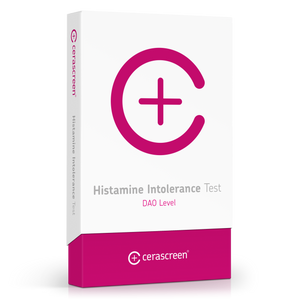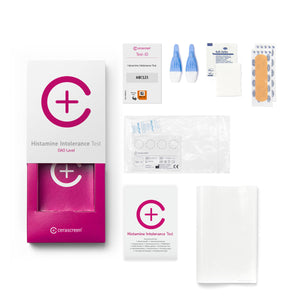Intolerance Tests
Choose categoryselftests
health-coaching
all
/blogs/health-portal
/pages/about-us
What’s the difference between an intolerance and an allergy?
Many people regularly suffer from symptoms such as abdominal pain, flatulence, diarrhoea and constipation. One possible reason is that they are intolerant to certain foods. In contrast to food allergies, intolerance symptoms often appear delayed, which makes them difficult to diagnose. You should keep a close eye on potentially problematic foods and symptoms – for example, with a food diary – and take an intolerance test if you suspect you may have one.
Our range of intolerance test kits, which comprises the Food Intolerance and Food Allergy Test, Gluten Intolerance Test, Protein Intolerance Test, Histamine Intolerance Test and Lactose Intolerance Test, are carried out using taking different types of samples. This range of intolerance tests is constantly expanding, so make sure to keep an eye out for new additions to our home intolerance test collection! We additionally offer a wide range of home allergy tests, which test for food allergies, latex allergy and animal hair allergies.
Types of intolerances
If you have an intolerance, certain substances from the food you eat cannot be properly utilised in your intestine, which leads to problems in digestion and sometimes elsewhere in the body.
- Histamine intolerance: Histamine is a messenger substance produced in the body, but it is also found in foods such as red wine, cheese and sausage meat. If the body breaks down the histamine from food too slowly due to an intolerance, it can cause discomfort, which impacts the whole body, with symptoms such as diarrhoea, skin irritation, a runny nose and a headache.
- Lactose intolerance: Lactose is another word for the sugar found in milk and in many other dairy products, such as yogurt, cream and many cheeses. Those with a lactose intolerance do not have enough of the enzyme lactase in their body, meaning that lactose can not be broken down effectively enough.
- Fructose intolerance: The fruit sugar fructose is found in fruits, certain vegetables, ready-made products and in standard sugar. If the intestine cannot properly absorb fructose due to a defective transport protein, this leads to fructose intolerance.
- Sorbitol intolerance: Sorbitol, a sugar substitute, is found in some types of fruit, dried fruit, sweets and as an additive in foods labelled as ‘light’. If someone has a sorbitol intolerance, sorbitol is broken down in the small intestine too slowly or even not at all.
- Gluten intolerance (coeliac disease): In coeliac disease, the immune system reacts against the protein gluten, which is found in many cereal products. This causes inflammation that can permanently damage the intestinal mucosa.
Screening for intolerances with a home intolerance test
Using the cerascreen® intolerance test kits, you can test whether you have a general food intolerance or a more specific intolerance, such as histamine intolerance, lactose intolerance, fructose intolerance, gluten intolerance or sorbitol intolerance. The intolerance test kits are mostly blood tests or hydrogen breath tests, and in both cases, you can simply take a sample within the comfort of your home. Our medical laboratory will then analyse your sample, and you’ll then receive a detailed results report providing you with personalised advice about your intolerances.
Should I change my diet if I have an intolerance?
With our Food Intolerance Test, one of our home intolerance tests, you can find out whether your body reacts with antibodies towards the foods that generally cause most food intolerances and allergies. This is done by simply collecting a small blood sample. If you have been diagnosed with a food intolerance, a change in diet is usually the only effective treatment.
For some intolerances, such as coeliac disease, you must give up the food that you cannot tolerate for life. Sometimes, naturally, this is not as easy as it sounds. Gluten, fructose and sorbitol, in particular, are hidden in numerous foods and ready-made food products. This then means that you have to cautiously study ingredients lists and ask about meal ingredients when eating out.
That’s why some people quickly feel helpless when they are advised to change their diet. In such cases, nutritional coaching can be incredibly helpful. Sessions with a nutrition expert will teach you what to look out for with your specific intolerance and how to enjoy a delicious and balanced diet, even if some foods have to be avoided.






